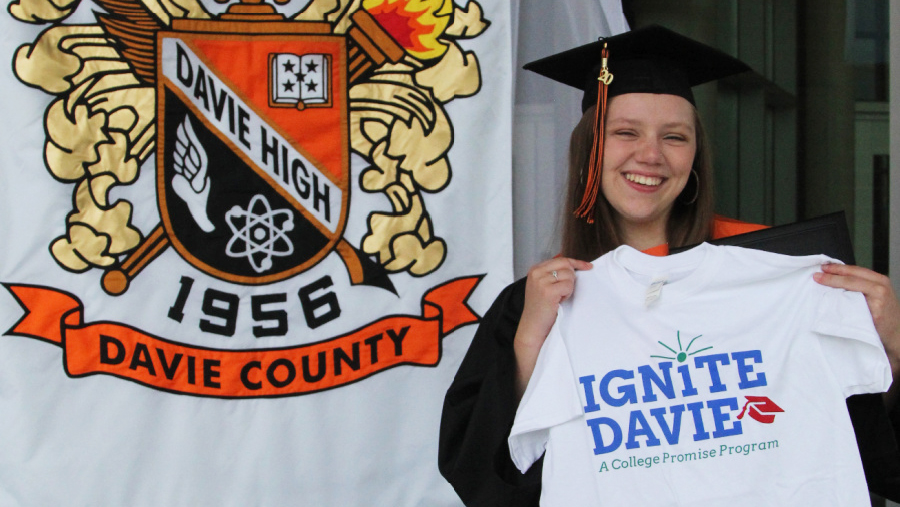Enhancing NC’s Workforce Through Education
Educational institutions are partnering with others in the community to level the playing field by providing supports, such as seminars on networking or meeting the financial requirements for study. Often non-educational community partners build coalitions to address student barriers such as food security, child care, and transportation.

The Problem
In the modern economy, having a college degree or any other post-secondary credential can be extremely valuable. More jobs than ever require some education beyond high school, and attaining these credentials can open many more potential career paths. Recognizing this, the North Carolina legislature crafted an ambitious goal: that 2 million individuals between the ages of 25-44 would possess a high-quality credential or postsecondary degree by 2030.
The Solution
The number of community partnerships focused on educational attainment is growing with support from the John M. Belk Endowment (The Belk Endowment) and its collaborators, such as myFutureNC, The Hunt Institute, and the NCWorks Commission. These organizations are all building capacity for collaboration on campuses and in communities.
Educational institutions are partnering with others in the community to level the playing field by providing supports, such as seminars on networking or meeting the financial requirements for study. Often non-educational community partners build coalitions to address student barriers such as food security, child care, and transportation.
One community is working together to overcome an important barrier: the sheer cost of post-secondary education. Across the board, tuition and fees at all higher education institutions have risen by around 10% in the past decade. This increase holds for 2- and 4-year programs at both public and private colleges and universities. In Davie County, local leaders have partnered with Davidson-Davie Community College to create IGNITE DAVIE, a scholarship program open to all high school graduates in the county. It covers tuition, fees, and required textbooks for any program at Davidson-Davie Community College, including certificates and associate degree programs. When the program was launched in the fall of 2020, student enrollment at Davidson-Davie tripled. This enrollment boost happened while many North Carolina community colleges lost enrollment due to the COVID-19 pandemic.
The Players
The Belk Endowment is at the forefront of ensuring North Carolina meets its goal. The Belk Endowment recognizes that, while arduous to obtain for many, the path to gaining a post-secondary credential or degree can be particularly challenging for some residents. For example, first-generation, lower-income, and some rural area students face an uphill battle.
The IGNITE DAVIE program has only been made possible through broad community support in Davie County. The Davie Community Foundation oversees the program, which provides grants and scholarships to improve Davie County residents’ lives. Community members and local businesses donated much of the initial principal for IGNITE DAVIE’s scholarships. The local school system is another important partner that ensures students know about the opportunity.
Aside from the benefits of higher education in the lives of individuals, having a more educated and qualified population means a competitive advantage for the County in attracting new businesses and maintaining a strong tax base. Other entities, including Davie County and Davie County Economic Development, have supported this program due to its civic benefits to the community.
The Promise
Even if every student who graduated between now and 2030 secured a post-secondary degree or credential, NC would fall short of the 2 million attainment goal. To help bolster efforts, communities are creating partnerships that allow more adults to increase educational attainment. In Pamlico County, for example, a partnership has formed between the Pamlico Correctional Institution and Pamlico Community College to build the state’s skilled workforce and help inmates find employment following their release. Pamlico Community College offers an associate’s degree program in Human Services Technology to inmates. The curriculum is designed to provide skills in areas that would help the formerly incarcerated find entry-level employment at organizations that provide educational, social, and community services. Those who have gone through the program say it offered much more than just an opportunity to attend classes and complete assignments. Students report that they gained a sense of accomplishment and re-entered the world equipped with a degree, boosting their confidence and self-image and reducing recidivism rates. Bridging the cultural divide between the two institutions has not always been easy. Still, as time goes on, the two have been able to work out differences and come together as partners to increase employment rates among released inmates. This program in Pamlico County is the largest of its kind in North Carolina. It is an inspiring example of North Carolina’s many opportunities to meet its goal of 2 million by 2030. Go, War Eagles!



